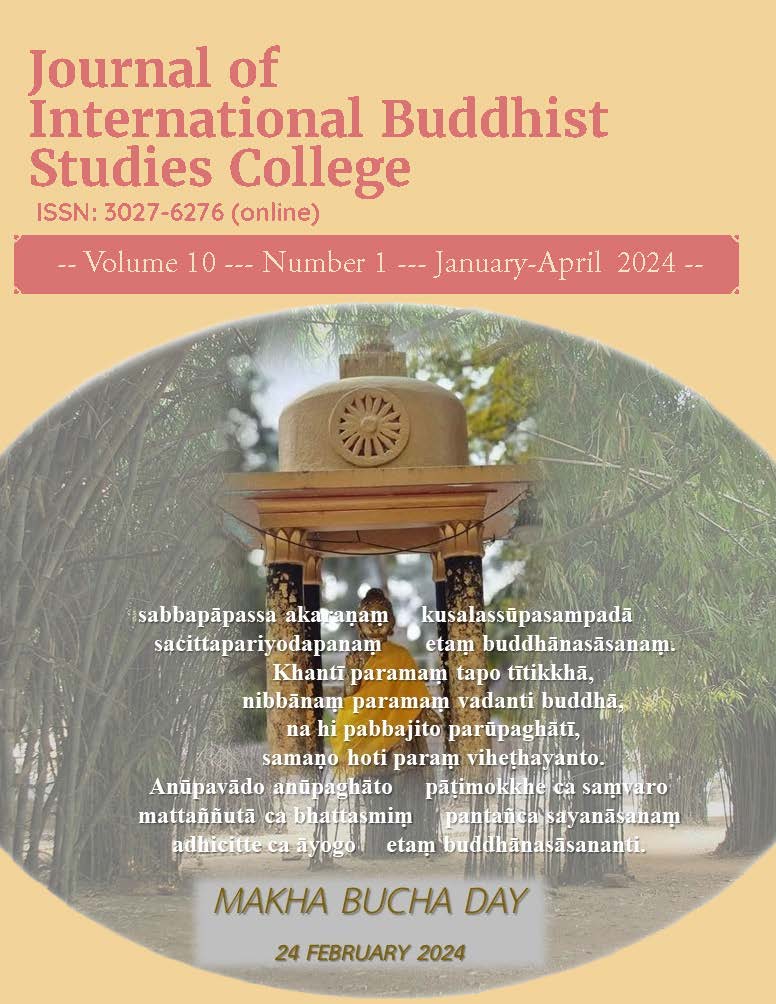The Process of Suffering’s Cessation as Depicted in the Dependent Origination
Main Article Content
Abstract
This research article aimed to (1) study the concept of suffering and the cause leading to suffering according to the Buddhist perspective, (2) analyze the suffering resolution based on Dependent Origination in Theravada Buddhism, (3) propose the process of suffering’s cessation as depicted in the Dependent Origination. The research methodology is documentary, involving in in-depth analysis of relevant documents and records.
The findings showed that there are three, or eight, types of suffering. All suffering comes from ignorance and craving. Ignorance leads one to believe that everything is permanent and unchanging, leading to attachment and craving, which lead to clinging to existence and the cycle of rebirth. The cycle of Dependent Origination illustrates the existence of suffering and its underlying causes. To cease suffering is to eliminate the cause of suffering. The Threefold Path is a process leading to the cessation of suffering. This path, which includes training in higher virtue, higher mind, and higher wisdom, leads to the cessation of suffering, the end of ignorance, the emergence of wisdom, enlightenment, and liberation from the cycle of birth and death. When the mind is filled with precept and liberation from the cycle of birth and death. When the mind is filled with precepts, concentration naturally follows. Concentrating the mind will facilitate the contemplation of the five aggregates, leading to the emergence of wisdom, the eradication of ignorance, the achievement of enlightenment, and the cessation of suffering. This is the process of ending suffering.
Article Details
The Journal of TCI is licensed under a Creative Commons Attribution-NonCommercial-NoDerivatives 4.0 International (CC BY-NC-ND 4.0) licence unless otherwise stated. Please read our Policies page for more information on Open Access, copyright and permissions.
References
Barua, S. (2023) The Development of Buddhist Peace Model for Non–Violence in Modern Society. The Journal of International Buddhist Studies College (JIBSC), 9(2), 91 -113.
Bhikkhu Bodhi. (tr..). (2000a). The connected discourses of the Buddha (Vol. I). Wisdom Publication.
Bhikkhu Bodhi. (tr.). (2000b). The connected discourses of the Buddha (Vol. II). Wisdom Publication.
Buddhadāsa Bhikkhu. (1992). Paticcasamuppada: Practical dependent origination. Vuddhidhamma Fund.
Chowdhury, S. B. (2019). The process of life in dependent origination: An analysis based on Buddhist psychology (Doctoral dissertation, Mahachulalongkornrajavidyalaya University).
Cittasaṃvaro, V. P. (2018). The integration of dependent origination and gestalt perception. (Doctoral dissertation, Mahachulalongkornrajavidyalaya University).
Gnaramama, V. P. (2000). Essential of Buddhism. Author.
Le Do, A. T., Dhammahaso, P. H., & Piyabhani, P. N. (2022). The Effective Way of Cultivating the Mind Based on Wise Attention (Yoniso-manasikāra). Journal of International Buddhist Studies, 13(1), 60-74.
Payutto, B. P. A. (2021). Buddhadhamma: The laws of nature and their benefits to life (R. P. Moore, tr. & B. Kovilo. ed.; 4th ed.). Buddhadhamma Foundation.
Payutto, P. A. (1994). Dependent origination: The Buddhist law of conditionality (B. Evant, tr.). Buddhadhamma Foundation.
Quilao, T. D. (2018). Human suffering: An integrative literature review. Cultura del Cuidado Enfermeria, 15(2), 67-79.
Rahula, W. (2007). What the Buddha taught. Open Road+ Grove/Atlantic.
Rahula, Y. (1997). The way to peace and happiness. Buddhist Cultural Centre.
Thich, N. H. (2013). The mindfulness survival kit: five essential practices. Parallax Press.
Ven. Nyanabhadra Pháp Tử, Sirikarnchana, P., & Phra Medhivajarapundit. (2023). The Way to Practice Applied Mindfulness in the tradition of Thich Nhat Hanh. The Journal of International Buddhist Studies College, 9(2), 127–146.


